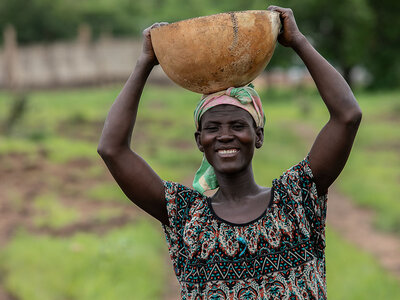Ghana
- 2.02 million
- people are food insecure
- 1 milion
- children under 5 are chronically malnourished
- US$59 million-plus
- used to support crisis-affected populations in 2024–2025
Ghana has made substantial development gains over two decades, reducing poverty and strengthening social services. However, progress toward the Sustainable Development Goals remains uneven amid recurring shocks.
Food insecurity has reached its highest levels since 2017, almost doubling to over 2 million people compared to the same period in 2024.
The Northern and Transition Zones - home to just 28 percent of the population - account for 56 percent of all food-insecure people. This includes all people experiencing Emergency levels of food insecurity.
Food insecurity is primarily driven by climate-related production losses, rising food prices due to inflation, and communal conflict disrupting livelihoods and access. Conflict is further compounded in regions sharing a border with conflict-torn neighbours, notably Burkina Faso, and consequent displacement of Burkinabe asylum seekers in northern regions of Ghana.
The World Food Programme (WFP) works with the Government of Ghana, UN agencies, civil society and the private sector to respond to emergencies and strengthen national food systems and social protection.
What the World Food Programme is doing in Ghana
-
Emergency preparedness and response
-
In collaboration with the Ghana Refugee Board, UNHCR, IOM, UNICEF and others, WFP is providing monthly cash transfers via MTN Mobile Money to nearly 3,000 asylum seekers and refugees in Tarikom (Upper East Region), Zini (Upper West), and Ata Kura, Kaska and Bawa Akura (all Bono East) settlements, who fled insecurity in Burkina Faso, while also supporting nearly 4,000 host community members, to promote social cohesion and meet food and essential needs. Despite WFP’s ongoing support, over 14,000 refugees lack critical food support due to funding constraints. Furthermore, WFP delivers lean-season assistance to over 13,000 people across 19 districts in Northern, Savannah, Upper West and Oti regions, in response to rising levels of food insecurity – which are most pronounced during the lean season. In parallel, WFP is providing institutional capacity strengthening support to partners like the National Disaster Management Organisation, to enhance emergency preparedness and response.
-
Nutrition
-
Food systems
-
Social protection
-
On-demand services
Ghana news releases
Go to pagePartners and donors
Find out more about the state of food security in Ghana
Visit the food security analysis pageOperations in Ghana
Contacts
Office
No. 7, 7th Rangoon Close, Cantonments, Accra, P.O. Box GP 1423
Accra, The Republic of Ghana
Ghana







